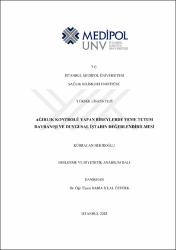| dc.contributor.advisor | Öztürk, Rabia İclal | |
| dc.contributor.author | Bekiroğlu, Kübracan | |
| dc.date.accessioned | 2021-06-30T07:12:54Z | |
| dc.date.available | 2021-06-30T07:12:54Z | |
| dc.date.issued | 2018 | en_US |
| dc.date.submitted | 2018-08-01 | |
| dc.identifier.citation | Bekiroğlu, K. (2018). Ağırlık kontrolü yapan bireylerde yeme tutum davranışı ve duygusal iştahın değerlendirilmesi. (Yayınlanmamış yüksek lisans tezi). İstanbul Medipol Üniversitesi Sağlık Bilimleri Enstitüsü, İstanbul. | en_US |
| dc.identifier.uri | https://hdl.handle.net/20.500.12511/7385 | |
| dc.description.abstract | Bu çalışma 1 Ocak-28 Şubat 2018 tarihleri arasında ağırlık kontrolü yapmak için diyet polikliniğine başvuran bireylerde yeme tutum davranışları ve duygusal iştahın değerlendirilmesi amacıyla yapılmıştır. Ağırlık kontrolü yapan 19-65 yaş arası 61 kadın ve 39 erkek olmak üzere 100 birey çalışmaya dahil edilmiştir. Katılımcıların antropometrik ölçümleri yapılıp; beslenme alışkanlıkları, fiziksel aktivite ve demografik özelliklerin olduğu anket formu, üç alt ölçekten (duygusal, kısıtlayıcı, dışsal) oluşan Hollanda Yeme Davranışı Anketi (DEBQ) ve Üç Faktörlü Yeme Ölçeği Anketi uygulanmıştır. Bireylerin yaşı arttıkça duygusal ve dışsal puanları azalmaktadır (p<0,05). Vücut ağırlığı artışının yaşandığı dönem cinsiyete göre anlamlı farklılıklar göstermektedir (p<0,05). Diyet sürecinde yaşadıkları olumsuz duygu durumları ile DEBQ puanları karşılaştırılmıştır. Depresif duygu durumuna sahip olduğunu belirten kadınların duygusal (31,96±10,39) ve dışsal (27,86±8,60) puanı yüksek, kısıtlayıcı puanı (24,82±6,55) ise düşük bulunmuştur. Erkeklerde ise kendini gergin olarak ifade edenlerin her üç alt ölçek puanı yüksek bulunmuştur. Beden Kütle İndeksleri normal olan bireylerin duygusal ve dışsal puanları obez bireylere göre daha düşük, kısıtlayıcı puanları daha yüksek bulunmuştur. DEBQ puanları ile enerji, makro ve mikro besin ögeleri karşılaştırıldığında, bireylerin yağ tüketim miktarı ile kısıtlayıcı yeme tutum puanı arasında negatif korelasyon tespit edilmiştir. Bireylerin kısıtlayıcı yeme tutum puanı arttıkça yağ tüketimi de artış göstermektedir. Alınan enerji, duygusal ve dışsal yeme tutum puanı ile pozitif, kısıtlayıcı yeme tutum puanı ile negatif korelasyon göstermiştir. Sonuç olarak, bireyler diyet sürecinde yaşadıkları olumsuz duygu durumları ile baş edebilmek için yeme tutum davranışlarını değiştirebilmektedir. Diyet süreçleri planlanırken bireylerin duygu durumlarının da değerlendirilmesi önem taşımaktadır. | en_US |
| dc.description.abstract | This study has been done to evaluate eating attitude behaviours and emotional appetite in individuals who apply to diet policlinics for weight control, between 1 january-28 february 2018. Between 19 and 65 ages individuals who were doing weight control, 61 women and 39 men were included in the study. Anthropometric measurements of participants was done and it was applied to participant, a survey form, including eating habits, physical activity, demographic characteristics, netherlands eating behavior survey which consisting of three subscales (emotional, restrictive and external) to assess emotional states, and three factorial eating questionnaire. As the age of the individual increases, emotional and external scores decrease(p<0.05). The period in which the first weight gain occurred was significantly different by sex (p<0,05). The psychological conditions they experienced in the dietary process and DEBQ scores were compared. Emotional (31,96±10,39) and extrinsic (27,86±8,60) scores were found to be high, restrictive (24,82±6,55) scores were found to be low, for women who stated that they had depressive mood. Whereas in males, all three subscale scores were found to be high for those who expressed themselves as nervous. Emotional and external scores of individuals with normal body mass indexes were lower and restrictive scores were high than those of obese individuals. When compared to the DEBQ scores, there was negative correlation between the amount of fat consumed by the individual and the restrictive eating attitude score. The received energy showed a positive correlation with the emotional and external eating attitude score and a negative correlation with the restrictive eating attitude score. As a result, individuals can change their eating attitude behaviors in order to cope with the negative emotions experienced during the diet. Eating attitude scores show individual and periodic differences. It is important to evaluate the emotional states of individuals while dieting processes are planned. | en_US |
| dc.language.iso | tur | en_US |
| dc.publisher | İstanbul Medipol Üniversitesi Sağlık Bilimleri Enstitüsü | en_US |
| dc.rights | info:eu-repo/semantics/openAccess | en_US |
| dc.subject | Ağırlık Kontrolü | en_US |
| dc.subject | BKİ | en_US |
| dc.subject | DEBQ | en_US |
| dc.subject | Makro ve Mikro Besinler | en_US |
| dc.subject | Üç Faktörlü Yeme Ölçeği Anketi | en_US |
| dc.subject | Weight Control | en_US |
| dc.subject | BMİ | en_US |
| dc.subject | DEBQ | en_US |
| dc.subject | Macro and Micro Nutrients | en_US |
| dc.subject | Three Factorial Eating Questionnaire | en_US |
| dc.title | Ağırlık kontrolü yapan bireylerde yeme tutum davranışı ve duygusal iştahın değerlendirilmesi | en_US |
| dc.title.alternative | Assessment of eating attitude and behavior and emotional appetite in individuals practising weight control | en_US |
| dc.type | masterThesis | en_US |
| dc.department | İstanbul Medipol Üniversitesi, Sağlık Bilimleri Enstitüsü, Beslenme ve Diyetetik Ana Bilim Dalı | en_US |
| dc.relation.publicationcategory | Tez | en_US |


















